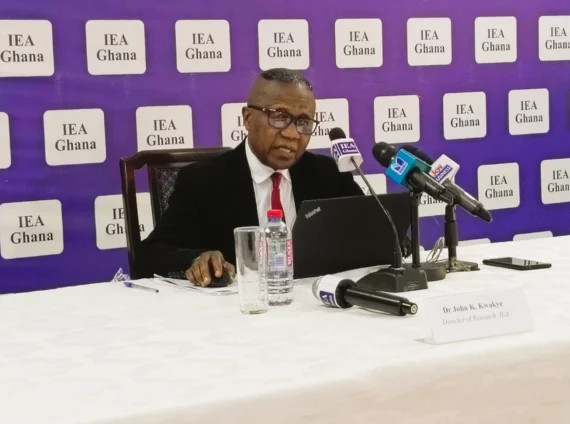The Institute of Economic Affairs (IEA) says it is time for Ghana to take ownership of its natural resource wealth to derive more benefits for the nation..
Dr. John K. Kwakye, Director of Research at IEA Ghana, said this during a press briefing on Wednesday to present the Institute’s reflections on President Akufo-Addo’s State of the Nation Address (SONA) on February 27 and the Monetary Policy Committee (MPC) Decision delivered by the Bank of Ghana Governor on March 25.
During the SONA, President Akufo-Addo praised Ghana for recovering its position as Africa’s largest gold producer, surpassing South Africa with gold production of four million ounces.
Dr Kwakye responded: “Taking Ghana’s reported annual production of four million ounces and multiplying by the current world price of US$2,200 per ounce gives US$8.8 billion. The question is, how much of this belongs to Ghana? Ghana’s share is not likely to exceed 20 per cent, or about US$1.8 billion, while the much bigger share of about US$7.0 billion goes to foreign companies.”
President Akufo-Addo also spoke about the development of a local gold refinery to increase the value of the commodity.
The Institute said the policy was long overdue and suggested that it be extended to all the country’s natural and agricultural commodities.
“We should construct cocoa processing factories and refineries for oil, bauxite, lithium, etc., to take advantage of the vast difference between the prices of the refined products and the raw commodities,” Dr Kwakye said.
The President again noted that the Domestic Debt Exchange Programme (DDEP) had made considerable progress.
Dr Kwakye commented on this, saying, “We should not lose sight of the immense hardship the DDEP has brought on bond holders, including pensioners and the financial sector, which was heavily exposed to Government debt. Even BoG was not spared the adversity.”
The Institute reiterated that Parliament should impose a debt ceiling of 60 per cent of GDP in the Fiscal Responsibility Act, in addition to the existing deficit ceiling, to ensure long-term debt sustainability.
Regarding taxes, the IEA noted that the government was elected on the premise of moving from taxation to production.
However, the Government had done the opposite, with the country experiencing “proliferation of taxes”.
The Institute contended that taxes including the E-levy, COVID-19 Levy, Growth and Sustainability Levy, Sanitation Levy, the failed Emissions Levy, Betting Levy, and VAT on power consumption were “multiple, nuisance or outdated taxes” that could not be justified.
The Institute pointed out that the government did not make an equal effort to reduce its expenditure, despite its size and multiple flagship initiatives.
“The fiscal consolidation being implemented under the IMF program has to be even handed; it must fall equally on expenditure and not just taxes,” Dr Kwakye emphasised.
Latest Stories
-
Price of LPG per kilogramme constitutes 22% of taxes – LPG Marketers Association
36 mins -
Nigeria appoint Finidi George as new Super Eagles boss
1 hour -
Elevating Ghana’s creative industry: A blueprint for competing with Nigeria and South Africa
2 hours -
Poor finishing a problem for Asante Kotoko throughout the season – Prosper Ogum
3 hours -
Samini teams up with Francis Osei for ‘Sticks N Locks’ EP
3 hours -
Government should resource record labels – Seven Xavier
3 hours -
I need majority in parliament to successfully complete my term – Akufo-Addo pleads
3 hours -
Next NDC government will not recognise illegal contracts signed by current administration – Sammy Gyamfi
3 hours -
Premier League clubs vote in favour of spending cap plans
4 hours -
Nigeria’s fuel crisis brings businesses to a halt
4 hours -
King Promise impresses fans at sold out show in Singapore
4 hours -
Ejisu by-election to proceed after plaintiff withdraws injunction application
4 hours -
CSOs and NGOs unite to push for priority demands at INC-4
4 hours -
Fuel tanker bursts into flames on Kumasi-Accra highway
4 hours -
Security is tightened ahead of Ejisu by -election
4 hours

